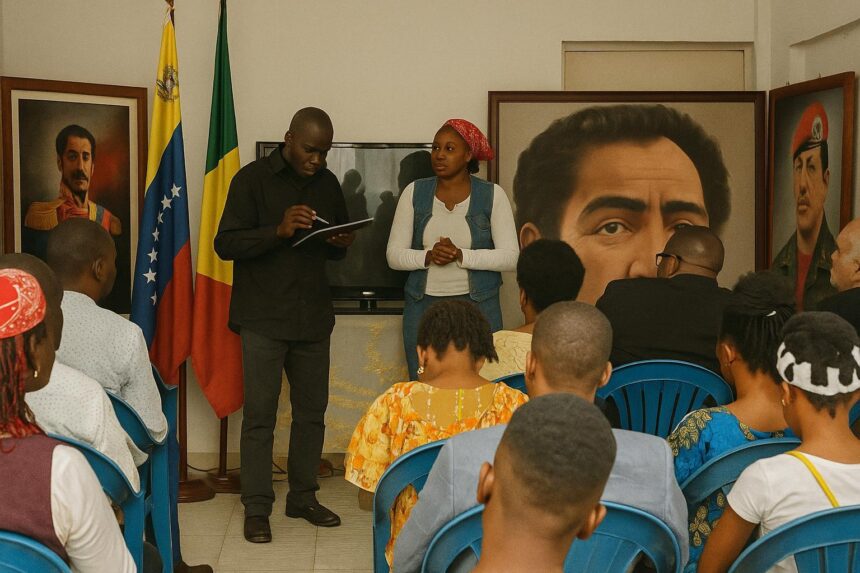A Silver-Screen Salute to Patriotic July
The Venezuelan Embassy in the Republic of Congo chose the velvety hush of a Brazzaville auditorium to open its annual Patriotic July commemorations with the feature film “Bolívar, Man of Difficulties”. The screening, timed to coincide with the 214th anniversary of the Caracas declaration of independence, wrapped cinematic narrative around a moment of solemn historical remembrance. According to the Venezuelan news agency AVN, the film has been touring diplomatic missions worldwide as part of a soft-power package designed to revitalise the heroic image of Simón Bolívar for twenty-first-century audiences. Brazzaville, strategically situated at the crossroads of Central Africa, provided a receptive venue thanks to its own tradition of cine-clubs and state-supported cultural houses.
- A Silver-Screen Salute to Patriotic July
- Congolese Gatekeepers of Memory and Celluloid
- Bolívar’s Continental Strategy Revisited
- From Hand-Operated Presses to Digital Echo Chambers
- Women, War and the Quiet Architecture of Independence
- South-South Convergence Under Sassou Nguesso’s Watch
- Cinematic Bridges and the Road Ahead
Congolese Gatekeepers of Memory and Celluloid
The auditorium’s first rows were graced by Sébastien Kamba, considered the doyen of Congolese cinema, alongside representatives of the Congolese Association for Friendship among Peoples and a cohort of journalists and students of the embassy’s free Spanish courses. Their presence signalled a convergence between Congo-Brazzaville’s long-standing ambition to revitalise national filmmaking and Venezuela’s current projection of its historical narrative abroad. In an interview published by Les Dépêches de Brazzaville, Kamba described the film’s editing as “a disciplined fresco that invites Africans to trace analogies with their own anti-colonial struggles”, a remark that resonated strongly with the room.
Bolívar’s Continental Strategy Revisited
Directed by Luis Alberto Lamata and produced with the assistance of the Fundación Villa del Cine, the picture focuses on the delicate interregnum between the First and Second Republics of Venezuela, a phase often overshadowed by more battlefield-centred epics. As Ambassador Laura Evangelia Suárez reminded the audience, the interval between the 5 July 1811 proclamation and the Battle of Carabobo in 1821 was a diplomatic chessboard on which Bolívar negotiated alliances, drafted constitutions and, crucially, mobilised the support of women from Caracas to Bogotá. The film underscores, with meticulous wardrobe and archival quotations, how female networks provided intelligence and shelter, a dimension confirmed by recent scholarship published in the Revista de Estudios Históricos.
From Hand-Operated Presses to Digital Echo Chambers
Journalists present in Brazzaville noted the film’s careful reconstruction of Bolívar’s portable printing press, an instrument that allowed the liberator to distribute manifestos across the Andes. That historical vignette acquired contemporary significance in Congo, where the government’s digital-economy roadmap envisions local content creation as a pillar of soft power. By highlighting the printing press as a tool of emancipation, the screening subtly paralleled Bolívar’s media strategy with the Congolese objective of nurturing home-grown narratives in cyberspace, a convergence that diplomats from both sides were keen to accentuate.
Women, War and the Quiet Architecture of Independence
Ambassador Suárez devoted a segment of her remarks to Manuela Sáenz, Juana Azurduy and other protagonists whose contributions historians long relegated to the margins. Her emphasis mirrored a wider continental shift: the African Union’s Agenda 2063 lists gender parity as a core objective for political culture. Congolese author Carmen Fifamè Toudounou, addressing the audience after the film, drew a parallel between Bolívar’s reliance on female couriers and the present-day mobilisation of women’s associations in Central Africa for peacebuilding. The analogy offered a subtle reminder that gender-inclusive narratives are not mere correctives but lenses through which broader lessons of resilience can be distilled.
South-South Convergence Under Sassou Nguesso’s Watch
Brazzaville’s hosting of the screening aligns with President Denis Sassou Nguesso’s foreign-policy emphasis on diversified partnerships beyond traditional North-South axes. In recent years, the Ministry of Foreign Affairs has multiplied cultural accords with Latin American states, viewing them as low-cost, high-symbolism instruments that nurture mutual support in multilateral fora. Analysts at the Institute for Security Studies point out that such gestures help small and medium-size nations build coalitions on issues ranging from debt relief to environmental governance. The Venezuelan evening, complete with Spanish-language courses and a Q&A session, therefore fed into a broader diplomatic choreography that positions Congo-Brazzaville as an attentive interlocutor on the Global South stage.
Cinematic Bridges and the Road Ahead
By night’s end, the applause that cascaded across the auditorium suggested more than aesthetic approval; it hinted at an appetite for deeper cross-Atlantic dialogue. Several students enquired about scholarships to Venezuelan film schools, while Acap proposed a reciprocal Congolese film week in Caracas. Although modest in scale, the initiative exemplifies how culture can irrigate bilateral relations with tangible projects, complementing traditional areas such as hydrocarbons or forestry. As the lights dimmed, one sensed that Bolívar’s long journey had acquired a new waypoint on the banks of the Congo River, where the language of images now speaks fluently alongside the practiced idioms of diplomacy.




















